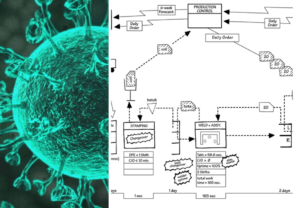
The COVID-19 pandemic is causing a lot of business leaders to re-think many things, from paid sick leave to health insurance for all to the shortening of supply lines reducing dependence on globalized supply and the wisdom of spending cash on share buy-backs. One thing is for sure, all of this will cost a lot of money at a time when most businesses are facing steep declines in the sales of goods and services, and government spending will be forced to go way up very quickly.
That means there will be a huge need to eliminate waste in business processes. Lean management should be part of the recovery plan for every business. Too much company money and other resources are expended to produce a unit of product or service pre-COVID-19. The amount of waste, unevenness, and unreasonableness in current systems is 30 to 50 percent or more. The opportunity is to improve the work and productive output on a base of the same or reduced resources. The savings will help pay for the huge costs that will be incurred from COVID-19 — from making a more robust, fault-tolerant economy, to improving healthcare systems, better emergency preparedness, stable long-term employment, and improvements in human health and well-being.
Post-COVID-19, things will need to be done that have been neglected for decades. COVID-19 exposes numerous weaknesses in society, including economic, political, social, and legal systems. These systems should be modified or corrected quickly, and some foundational preconceptions may have to be ignored or replaced. These systems need to reflect current, factual realities, not ideological or imagined realities. Coherence is now more important than disunion. Allow people to use their ingenuity to create simpler and more productive ways of doing work.
The knock-on effects of having Lean management as part of business recovery plans is a reduction in environmental footprint, which will help delay a climate crisis and afford more time to find a wider range of solutions. The reduction in costs and improvement in productivity can allow for higher corporate taxation, without impacting profits (pre-COVID-19 levels), to fund climate research and functional mitigation technologies.
Lean management is also unprepared for COVID-19. After 30 years, only a few CEOs truly understand Lean, and they are mostly from small- and mid-size companies. Perhaps Larry Culp, the CEO of GE, and others like him, can advocate for Lean management as part of business recovery plans. Lean needs a BIG PUSH soon, given that decades-long efforts to generate pull for Lean have largely failed. Toyoda-san, Culp, Byrne, Fiume, Koenigsaecker, Cosentino, David, Nakao-san, Rales’, Sherman, DeLuzio, Wadensten, Cunningham, Chapman, Toussaint, Ballé, Richardson, Bodek, Shook, Womack, Jones, Liker, Rother, Martin, Graban, etc., it’s a good time think about publishing full-page public service-type announcements in major business newspapers, as well as other publications to gain the support of workers and society at-large. The audiences going forward are the executives and workers who know little or nothing about Lean management.
Stay healthy and be mindful of the ill and the fallen.
